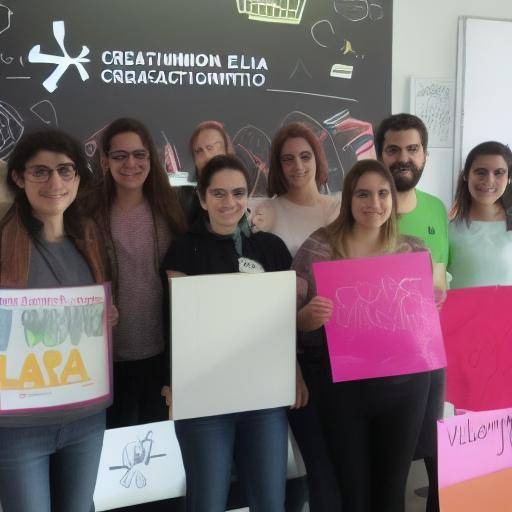
Introduction
Volunteering not only involves helping others disinterestedly, but is also a unique opportunity to build meaningful networking. In this article, we will explore the importance of volunteering in the creation of these networks and how it contributes to the development of meaningful interpersonal relationships. We will discover how volunteering not only benefits those who receive it, but also those who offer it. In addition, we will analyze the current benefits, challenges, and trends in this area to provide a complete view of the topic.
History and Background of the Volunteer and Contact Networks
Volunteering has deep roots in the history of humanity. From ancient civilizations to today, altruism has been a common practice in all cultures. Over time, volunteerism has evolved and adapted to different cultural and socio-economic contexts, playing a crucial role in networking and interpersonal relationships.
Benefits of Volunteering in the Creation of Contact Networks
Volunteering offers many benefits to those involved, including, but not limited to, the establishment of meaningful networking. Through voluntary activities, people can form authentic connections with individuals who share their values and commitments, which can generate long-term professional and personal opportunities. Volunteering also allows the development of soft skills, such as teamwork, empathy and communication, which are fundamental in the creation and maintenance of solid interpersonal relationships.
Challenges of Volunteering and Building Contact Networks
Despite the benefits, volunteering also presents challenges in creating meaningful networking. Some people may experience difficulties in establishing solid connections or may face obstacles to finding volunteer opportunities that align with their personal interests and goals. In addition, the lack of time or limited resources may hinder continued participation in voluntary activities, which in turn affects the construction of networks of contacts.
Detailed Analysis: Current Trends and Perspectives
Volunteering has experienced a significant change in recent decades, with a growing focus on networking and interpersonal relationships in both professional and personal environments. Technological advances have facilitated the connection between volunteers and organizations, which has expanded opportunities for meaningful contacts. In addition, the growing recognition of the importance of volunteerism in building interpersonal relationships has led to the implementation of programs and events aimed at facilitating the connection between volunteers and communities.
Comprehensive Review: Applications and Best Practices
Volunteering can encompass a wide range of activities and sectors, from humanitarian aid to local community projects. Each form of volunteering offers unique opportunities to build meaningful networking. Volunteers have the possibility of connecting with a variety of people, from community leaders and local entrepreneurs to professionals from various industries. These connections can provide access to job opportunities, mentoring, and long-term collaborations.
Comparative analysis
Contact networks, volunteering and interpersonal relationships are complemented and mutually reinforcing in many respects. Contact networks provide a framework that facilitates volunteering by connecting individuals with organizations and causes that are passionate about them. In turn, volunteerism fosters the development of solid interpersonal relationships by uniting people with shared interests and values, which can result in long-term meaningful personal and professional relationships.
Practical Tips and Accessible Recommendations
If you're considering participating in volunteer activities to expand your networking, here are some practical tips that can help you maximize your efforts:
- Identify your passions: Choose causes and volunteering activities that will appeal to you. In doing so, you will be more motivated and you will be more likely to connect with people who share your interests.
- Set clear goals: Before starting your participation in volunteering, reflect on your goals and what you expect to achieve through the connections you generate. Setting specific goals will help you focus your efforts and maximize the benefits of your contacts networks.
- Be proactive: Actively engage in volunteer activities and seek opportunities to interact with other volunteers, organization leaders and beneficiaries. Participating proactively will allow you to establish meaningful relationships in a mutually supportive environment.
- Offer your help: In addition to connecting with others, look for ways to provide your help and support to those you interact with. Volunteering is not only about receiving, but also giving, and being useful to others can strengthen your ties with the community and the people you serve.
- Keep in touch: Once you've established meaningful connections through volunteering, it's important to keep in touch with the people you're dealing with. Maintaining regular communication and showing genuine interest in your lives will strengthen your long-term contacts networks.
Industry Perspectives and Expert Reviews
Experts in the field of volunteering and interpersonal relationships agree that volunteering is a powerful tool to build meaningful networking. Many highlight the importance of authenticity and collaboration in the development of lasting relationships through volunteerism. They also point out that volunteering not only benefits the individuals involved, but also enriches the communities in which it develops.
Case Studies and Real Life Applications
Numerous examples of success show how volunteering has served as a platform for creating valuable networking that has positively impacted both the professional and personal lives of volunteers. From entrepreneurs who have found business partners through volunteer activities to students who have obtained academic and work opportunities thanks to connections made at voluntary events, success cases illustrate the transformative potential of volunteering in networking.
Future Trends and Predictions
As awareness of the importance of volunteering in networking continues to grow, organizations and communities are expected to develop more sophisticated strategies to facilitate the connection between volunteers and networking opportunities. In addition, it is anticipated that the positive impact of volunteerism on interpersonal relationships will remain a central theme in the discussion on social welfare and community development.
Conclusion
Volunteering is not only a valuable way of contributing to the well-being of others, but also a powerful tool for creating meaningful networking. By actively participating in volunteering activities, individuals have the opportunity to form authentic relationships that can enrich their personal and professional lives. By cultivating these connections with care and authenticity, volunteerism can serve as a means of expanding meaningful networks of contacts that generate long-term opportunities.
Frequently asked questions
Is volunteering a good way to expand my network of professional contacts?
Yes, volunteering can be an excellent way to expand your network of professional contacts. By participating in volunteer activities related to your professional field or your interests, you will have the opportunity to meet people who share your goals and values, which can generate meaningful networking opportunities.
How can I find volunteer opportunities that align with my interests and abilities?
You can look for volunteer opportunities in local organizations, websites specialized in volunteering or through social networks. You can also contact charities directly to find out about volunteer opportunities and express your interest in participating.
What personal benefits can I get from volunteering in addition to networking?
Volunteering can provide significant personal benefits, such as skills development, a greater sense of purpose and satisfaction, as well as a sense of belonging to the community. In addition, it can contribute to your emotional and mental well-being by offering the opportunity to make a difference in the lives of others.
How can I maximize networking opportunities during volunteering?
To maximize networking opportunities during volunteering, it is important to actively participate in activities, show genuine interest in the people with whom you interact, and look for opportunities to collaborate and provide your help. Maintaining contact with people you know through volunteering is also crucial to building and maintaining solid connections.
Can volunteering be beneficial for the development of interpersonal relationships outside the professional realm?
Yes, volunteering can be a powerful way of developing interpersonal relationships outside the professional arena. By participating in voluntary activities, you will have the opportunity to meet people from different backgrounds and experiences, which can enrich your social circle and offer new perspectives.
How can I balance volunteerism with my professional and personal commitments?
Balancing volunteerism with your professional and personal commitments may require clear planning and setting of limits. It is important to select volunteer activities that fit your availability and priorities, and clearly communicate your limits to the organizations you collaborate with.
Are there specific events or initiatives in my area that facilitate networking through volunteerism?
Yes, many communities and organizations offer events and programs specifically designed to facilitate networking through volunteerism. You can look for volunteer events, community service fairs or mentoring programs that encourage meaningful connections within the community.
In short, volunteering is not only a way to contribute to the well-being of others, but also a valuable tool for creating meaningful networking and developing lasting interpersonal relationships. By taking advantage of volunteer opportunities in a proactive and authentic way, individuals can build connections that not only enrich their lives, but also generate long-term professional and personal opportunities.



































